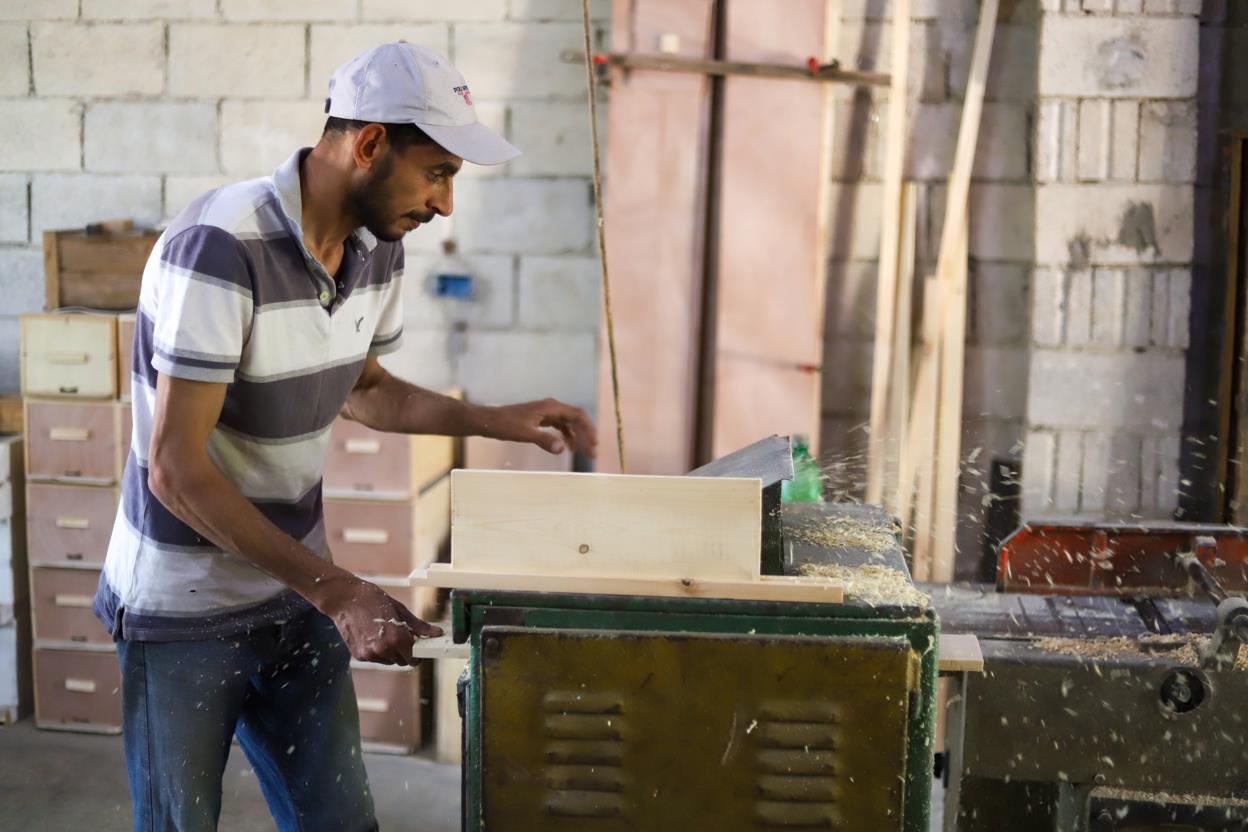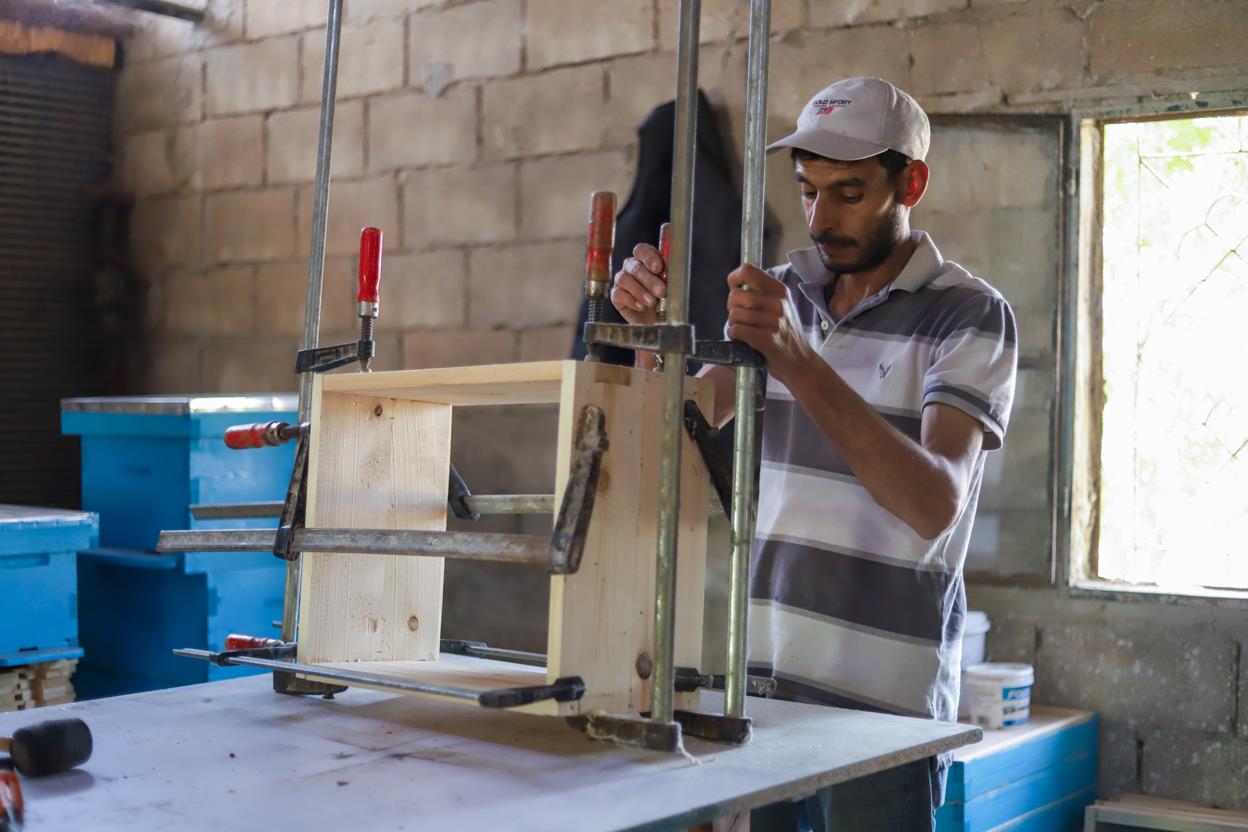
Syrians create buzzing agricultural businesses
FAO’s Nabta programme is helping entrepreneurs kick start agri-ventures
Through the European Union-funded Nabta programme, FAO is supporting entrepreneurs like Maher Dallah in their agricultural and agriculture-related businesses. © FAO/Mokhtar Al-Samman
30/11/2022
Maher Dallah takes a plank of wood and carefully feeds it into the teeth of the bandsaw, cutting it to the right size, before running it through a sander to take off the rough edges. The smell of freshly cut wood fills his workshop.
Later, he glues, staples and clamps the pieces together to build the sections of the beehives he makes to earn his living.
"I build different kinds of beehives, along with doing repairs and making other beehive accessories like pollen traps, insulation, and so on,” says Maher, a 33-year-old from Ar-Rastan in the Homs Governorate of the Syrian Arab Republic.
Bees in his blood
Maher wasn’t a complete stranger to bees and hives before he went into the business.
"I am originally a woodworker. My grandfather used to make traditional beehives from clay and taught me how to do it. I was always fond of bees and beekeeping,” he says.
Maher built on his carpentry skills with help from FAO’s programme entitled Nabta (the Arabic word for seedling). The Nabta training is FAO’s leading agri-preneurship programme, implemented under the Smallholder Support Programme, which the European Union funds. Through Nabta, FAO supports young people in their entrepreneurial initiatives in agriculture and agriculture-related sectors. Participants get general training on agriculture and business.
Investing in youth is vital to ensure the future of the country’s agricultural sector, as well as the livelihoods of these young people and the food security of their communities. Through Nabta, FAO has helped about 2 000 beneficiaries in total in the governorates of Homs, Aleppo, Deir Ez-Zor and Al-Hasakah, to assist youth start-ups of some impressive businesses in rural areas.


Investing in youth is vital to ensure the future of Syria’s agricultural sector, as well as the food security of its communities. © FAO/Mokhtar Al-Samman
In 2021, this specialized programme implemented in Ar-Rastan reached 500 young Syrians who received the first stage of training. Of these, the best 150 candidates were selected to transform their ideas into businesses and so progressed to Nabta’s next stage of more advanced training. Thirty-four of them ultimately received a grant to support their ventures.
Maher was one of them after an FAO experts’ panel accepted his proposal on assembling, repairing and selling wooden beehives and beekeeping accessories. He received training, financial assistance and mentorship in setting up a small business.
"During my training with Nabta, my proposal was to make beehives because I wanted to carry on with what I learned as a child and to keep the craft alive in the family,” Maher says. He already had a modest workshop, but it was not doing well. The FAO project provided him with training and high-quality wood that allowed him to start producing sturdier beehives.
After receiving this support from FAO, Maher managed to increase his workshop’s capacity fivefold in less than one year and reach new customers in Homs and Hama governorates. As a result, he now earns more money, which he reinvests in his business and uses to support his family.
“My experience with Nabta was very useful. I learned how to manage my project, what skills I need to learn, where to sell my products, how to calculate profits and losses, how to keep the customer happy and how to expand to new markets,” Maher says.

Maher expanded his business to beekeeping in addition to making hives, providing additional income that helps him pay for his children’s schooling. © FAO/Mokhtar Al-Samman
From beehive maker to beekeeper
The skills and confidence Maher gained from the Nabta programme helped him expand his business when the opportunity unexpectedly presented itself in the form of a barter deal.
“One of my customers, a bee merchant, offered to pay me with bees,” says Maher. “This way I could start a beekeeping business next to my workshop. There is less demand for beehives in the summer, so honey production will help maintain a stable income all year round.”
Producing beehives and honey might continue to run in the family, with his children appearing to share their father’s passion.
"My four children are excited about beekeeping. My youngest son is always curious about bees and loves helping me with beekeeping. What matters most is that the additional income I can make from honey will contribute to their schooling expenses,” he says.
Maher acknowledges that it was the Nabta training that helped him to launch this new venture.
"This is now my profession, and I'm going to continue making quality products and maintain my reputation to attract more clients and feed my family,” Maher says. "I'm planning to grow my business to reach new governorates."
Maher is one of the young people that Nabta has trained to be the next generation of Syrian agricultural entrepreneurs. By introducing communities to the latest advances in agriculture and ways to set up agricultural businesses, the programme aims to draw people into this field full of opportunities and spread more positive attitudes in the minds of youth regarding this burgeoning and vital sector of the economy.
Related links
Learn more
- Website: FAO country profile: Syrian Arab Republic
- Website: FAO in Syria
- Website: FAO emergencies and resilience

